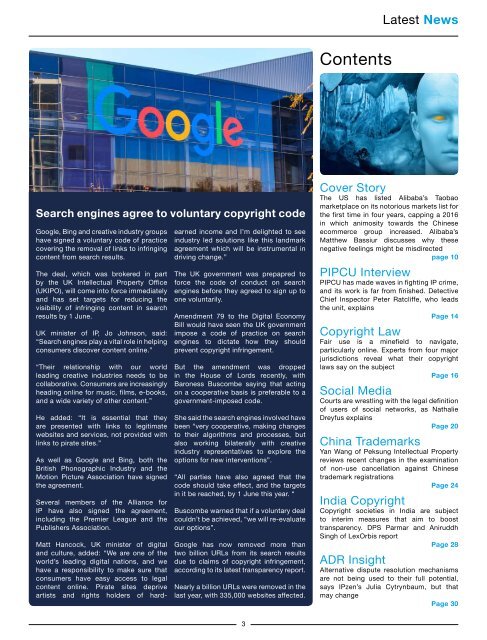Alibaba Group An Interview with Matthew Bassiur
2lKIzqg
2lKIzqg
You also want an ePaper? Increase the reach of your titles
YUMPU automatically turns print PDFs into web optimized ePapers that Google loves.
Latest News<br />
Contents<br />
Search engines agree to voluntary copyright code<br />
Google, Bing and creative industry groups<br />
have signed a voluntary code of practice<br />
covering the removal of links to infringing<br />
content from search results.<br />
The deal, which was brokered in part<br />
by the UK Intellectual Property Office<br />
(UKIPO), will come into force immediately<br />
and has set targets for reducing the<br />
visibility of infringing content in search<br />
results by 1 June.<br />
UK minister of IP, Jo Johnson, said:<br />
“Search engines play a vital role in helping<br />
consumers discover content online.”<br />
“Their relationship <strong>with</strong> our world<br />
leading creative industries needs to be<br />
collaborative. Consumers are increasingly<br />
heading online for music, films, e-books,<br />
and a wide variety of other content.”<br />
He added: “It is essential that they<br />
are presented <strong>with</strong> links to legitimate<br />
websites and services, not provided <strong>with</strong><br />
links to pirate sites.”<br />
As well as Google and Bing, both the<br />
British Phonographic Industry and the<br />
Motion Picture Association have signed<br />
the agreement.<br />
Several members of the Alliance for<br />
IP have also signed the agreement,<br />
including the Premier League and the<br />
Publishers Association.<br />
Matt Hancock, UK minister of digital<br />
and culture, added: “We are one of the<br />
world’s leading digital nations, and we<br />
have a responsibility to make sure that<br />
consumers have easy access to legal<br />
content online. Pirate sites deprive<br />
artists and rights holders of hardearned<br />
income and I’m delighted to see<br />
industry led solutions like this landmark<br />
agreement which will be instrumental in<br />
driving change.”<br />
The UK government was prepapred to<br />
force the code of conduct on search<br />
engines before they agreed to sign up to<br />
one voluntarily.<br />
Amendment 79 to the Digital Economy<br />
Bill would have seen the UK government<br />
impose a code of practice on search<br />
engines to dictate how they should<br />
prevent copyright infringement.<br />
But the amendment was dropped<br />
in the House of Lords recently, <strong>with</strong><br />
Baroness Buscombe saying that acting<br />
on a cooperative basis is preferable to a<br />
government-imposed code.<br />
She said the search engines involved have<br />
been “very cooperative, making changes<br />
to their algorithms and processes, but<br />
also working bilaterally <strong>with</strong> creative<br />
industry representatives to explore the<br />
options for new interventions”.<br />
“All parties have also agreed that the<br />
code should take effect, and the targets<br />
in it be reached, by 1 June this year. “<br />
Buscombe warned that if a voluntary deal<br />
couldn’t be achieved, “we will re-evaluate<br />
our options”.<br />
Google has now removed more than<br />
two billion URLs from its search results<br />
due to claims of copyright infringement,<br />
according to its latest transparency report.<br />
Nearly a billion URLs were removed in the<br />
last year, <strong>with</strong> 335,000 websites affected.<br />
Cover Story<br />
The US has listed <strong>Alibaba</strong>’s Taobao<br />
marketplace on its notorious markets list for<br />
the first time in four years, capping a 2016<br />
in which animosity towards the Chinese<br />
ecommerce group increased. <strong>Alibaba</strong>’s<br />
<strong>Matthew</strong> <strong>Bassiur</strong> discusses why these<br />
negative feelings might be misdirected<br />
page 10<br />
PIPCU <strong>Interview</strong><br />
PIPCU has made waves in fighting IP crime,<br />
and its work is far from finished. Detective<br />
Chief Inspector Peter Ratcliffe, who leads<br />
the unit, explains<br />
Page 14<br />
Copyright Law<br />
Fair use is a minefield to navigate,<br />
particularly online. Experts from four major<br />
jurisdictions reveal what their copyright<br />
laws say on the subject<br />
Page 16<br />
Social Media<br />
Courts are wrestling <strong>with</strong> the legal definition<br />
of users of social networks, as Nathalie<br />
Dreyfus explains<br />
Page 20<br />
China Trademarks<br />
Yan Wang of Peksung Intellectual Property<br />
reviews recent changes in the examination<br />
of non-use cancellation against Chinese<br />
trademark registrations<br />
Page 24<br />
India Copyright<br />
Copyright societies in India are subject<br />
to interim measures that aim to boost<br />
transparency. DPS Parmar and <strong>An</strong>iruddh<br />
Singh of LexOrbis report<br />
Page 28<br />
ADR Insight<br />
Alternative dispute resolution mechanisms<br />
are not being used to their full potential,<br />
says IPzen’s Julia Cytrynbaum, but that<br />
may change<br />
Page 30<br />
3


